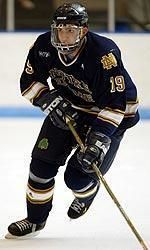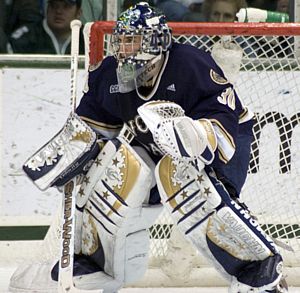Notre Dame has overcome the doubters at every turn this season.
Picked seventh in the CCHA before the season, the Irish have put together a year for the ages, compiling a 27-6-3 record and winning their first-ever CCHA regular-season title. Even though the Irish enter the playoffs No. 1 in the polls and No. 2 in the PairWise, the doubters remain. One thing no one can question, however, is that the Irish seniors deserve every bit of success they achieve this season after enduring a rollercoaster four years under the Dome.
Of the hockey class of 2007, seven members regularly contributed to Notre Dame’s first-ever NCAA tournament team during their freshman year. Forwards T.J. Jindra and Jason Paige, along with defenseman Wes O’Neill, played in all 39 games, and David Brown made 26 appearances in goal.

Despite the Irish’s loss to Minnesota in the first round, the future appeared bright. But after completing the best season in Notre Dame’s history, the following year was the worst in Notre Dame’s modern hockey history. The team went 5-27-6 and did not record a win in its last 19 games.
Enter Jeff Jackson. After the 2004-05 season, coach Dave Poulin resigned and the Irish turned to Jackson to rebuild a suddenly struggling program. Jackson, who had most recently been an assistant coach with the New York Islanders, knew he had a challenge ahead of him.
The class of 2007, now juniors, was at a crossroads with Jackson’s entrance. No one was sure whether Jackson would attempt to build his team around them or shun them for younger and perhaps more talented players.
O’Neill was contemplating accepting a contract to turn pro, and Brown was coming off a season where he went 2-10-1 with a 4.30 GAA and a save percentage of only .870. Paige and Josh Sciba both saw their stats decline after solid freshmen campaigns. Sciba and O’Neill actually tied for the team lead in goals, but only scored six apiece.
Despite the previous season, Jackson viewed the upperclassmen as the foundation of his team. Jindra was named the captain as a junior, and Jackson made every effort to embrace, not alienate, his upperclassmen.
“Instead of trying to force guys out, I tried to let them know that once I took this job, you’re my players,” Jackson said. “I may not have recruited you here, but I’m your coach now.”
After a 13-19-4 season last year and an eighth-place CCHA finish, Jackson seemed to have the Irish turned in the right direction. Still, not even Jackson expected the Irish to be this good this soon. Coming into the year, Jackson hoped his team could finish in the top four of the CCHA and earn a first-round bye.
An early trip to the East Coast was the first indication that this season might hold something more than expected. After splitting a home-and-home with Minnesota State, the Irish faced a daunting task: two road games in two nights against Boston College, ranked No. 1 at the time, and Providence.
The Irish responded brilliantly. Aided by a hat trick by junior Mark Van Guilder, Notre Dame blew out BC 7-1. Freshman Dan Kissel netted another hat trick the next night, and a 6-1 victory over the Friars capped a huge weekend for the Irish.
“People made a lot of out the Boston College game, but to be able to come back the next night and have success was the first sign that we could be a better team [than we originally thought],” said Jackson of the road trip.
With expectations raised, Notre Dame did not disappoint in conference play, finishing 21-4-3. The Irish relied heavily on their defense, which, led by O’Neill and fellow seniors Noah Babin and Tom Sawatske, finished the regular season as the top-ranked defense in the country.
On a team of few stars, Brown has stood out, putting up career-best numbers across the board with a 25-5-3 record, a 1.68 goals against average, a .927 save percentage as well as a school-record five shutouts. Brown has emerged as a favorite to capture college hockey’s top individual prize, the Hobey Baker Memorial Award.
When asked what a Hobey Baker award might mean for the program, Jackson stressed the exposure that comes with it.
“Notre Dame needs to be put on the map as far as college hockey goes,” he said. “Awards are nice, but being recognized for excellence is the most important thing. The recognition of David is going to be directly related to how the team’s done.”

Senior forwards Michael Bartlett, Paige, Sciba, and Jindra joined Brown and the defensemen as the dependable foundation of the team. As the season went on, however, the Irish turned to younger players to pick up the scoring.
Freshmen Kevin Deeth and Ryan Thang played on the top line for much of the year along with sophomore Eric Condra, and the three finished as the team’s top three point scorers. Van Guilder was fourth, and sophomore Garrett Regan has had a breakout year, scoring 12 goals and finishing fifth on the team in scoring.
For Jackson, the willingness of the seniors to step aside for some of the underclassmen was a key to the season.
“What the seniors have done best is incorporating the young kids and not having an envy or jealousy for some of the success our freshmen have had,” he said. “It’s been a total team effort and the contributions from the older guys have been really helpful to the team.”
Despite the contributions from the seniors, one of Notre Dame’s major concerns going into the playoffs is experience. While the seven seniors have been in the NCAA tournament, none has faced the challenge at hand: for the first time, they are the team everyone wants to beat in the playoffs.
However, Notre Dame’s scheduling attempted to provide some exposure to playing on the big stage. Trips to Fort Wayne’s War Memorial Coliseum and Pittsburgh’s Mellon Arena, along with the Lightning College Hockey Classic in Tampa Bay, were designed to give the young Irish as much experience in big arenas as possible. Jackson also noted the Boston College trip and a 7-3 victory in Michigan’s Yost Arena as wins in a hostile environment that would provide confidence in the playoffs.
The more immediate concern is the two-week layoff before the CCHA playoffs. While a weekend off will be good for some of the injured and tired Irish players, they have to be careful not to let rust creep into their game.
Jackson was hurt by the layoff earlier in his career, when his top-ranked Lake Superior State team was upset in the first round of the 1991 NCAA tournament after a long layoff. The greatest concern for Jackson is Game 1 on Friday night, when the Irish face the challenge of an Alaska team that has just come off an emotional series win. Jackson said one of the biggest factors on Friday night could be the support of a boisterous home crowd, especially the students.
“Our students have been awesome all year long. They make a big difference,” Jackson said, also speaking about the importance of being placed in a NCAA regional close to home.
“I’d like to see us play in Grand Rapids for our fans. I’d like to think that maybe we could get a thousand students to bus up there,” Jackson mused. “The following this year has been much better, and I’d like our fans to have the opportunity to see us play in the NCAA tournament.”
Regardless of how this season ends, the future looks bright for the Fighting Irish. Notre Dame’s incoming class of seven players is widely-regarded as one of the best in the country. Goaltender Brad Phillips and defensemen Ian Cole and Teddy Ruth will come from the U.S. Under-18 team. Forwards Robin Bergman, Billy Maday, Calle Ridderwall, and Ben Ryan are all having solid seasons in the USHL and should immediately infuse some additional skill into the Notre Dame offense.
With that injection of talent, Jackson envisions a return to the more aggressive style of hockey his LSSU teams played.
“When I first came in here I envisioned playing an up-tempo style,” Jackson said. “We ended up becoming a little more conservative. Next year may allow us to play more the style of hockey that I was originally intending.”
With the current and incoming talent, the Irish appear to be stacked for years to come. It’s possible that the future will hold many more banners to be raised in a yet-to-be-constructed arena. Team and individual records may be set, and players may go on to NHL success.
As the years roll by, this year’s senior class may fade into the background. Besides Brown, none of these seniors will stand atop the record books, and it remains to be seen which might make names for themselves at the next level.
But when any Fighting Irish hockey fan stares at those banners in the future, they will remember the foundation the class of 2007 built. David Brown, Wes O’Neill, Tom Sawatske, Noah Babin, Josh Sciba, Michael Bartlett, T.J. Jindra, and Jason Paige have already left a legacy.
But don’t try to convince any of them of that quite yet. There are still a few more dreams to be realized for the Irish this season.


